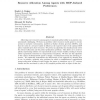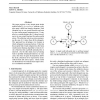74 search results - page 7 / 15 » Designing Effective Policies for Minimal Agents |
JAIR
2006
13 years 7 months ago
2006
Allocating scarce resources among agents to maximize global utility is, in general, computationally challenging. We focus on problems where resources enable agents to execute acti...
AAAI
2008
13 years 9 months ago
2008
This paper highlights the crucial role that modern machine learning techniques can play in the optimization of treatment strategies for patients with chronic disorders. In particu...
CHI
2009
ACM
14 years 8 months ago
2009
ACM
In this paper, we describe progress in research designed to explore the effect of the combination of avatars' visual fidelity and users' anticipated future interaction o...
WETICE
1996
IEEE
13 years 11 months ago
1996
IEEE
This paper describes a security architecture designed to support role-based access control for distributed object systems in a large-scale, multi-organisational enterprise in whic...
ICML
2003
IEEE
14 years 8 months ago
2003
IEEE
The paper explores a very simple agent design method called Q-decomposition, wherein a complex agent is built from simpler subagents. Each subagent has its own reward function and...


